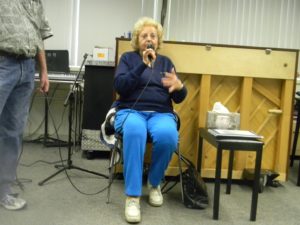On Thursday, March 6th, Mountain View High School students and staff had the honor of hearing Holocaust survivor Helen Farkas recount her stories.
Born in October 1920, Farkas was one of 9 children and grew up in a small town in Romania, very close to the border of Hungary. Farkas describes the beginning of her childhood as alright, at the time her people had all the rights other Romanians did.
Hitler didn’t take Romania until 1940, and by 1942 the Nazis had confiscated Jewish people’s radios, isolating them from what was going on in the rest of the world. Farkas’s older brother, however, hid and kept his radio. Their father, who spoke a little English, listened to the British reports and was able to hear stories about war activity. Farkas remembers telling her father to stop listening to the radio because the stories were always tragic.
In 1944, Farkas and the women in her family were forced to move into ghettos while the men were drafted into labor camps. The ghettos were created right in her hometown, so Farkas and other women just had to put a lock on their houses and go. They then had to give their pets away to non-Jewish friends, hoping they’d soon be back to retrieve them. In the midst of this inexplicable turn of events, Farkas asked, how do you suddenly interrupt life?
There wasn’t enough food in the ghettos. Farkas and her friends would play school with the children to keep them entertained while their mother prepared the little food they had. Other times they would go into the administrations office and ask why they let this happen; why they would allow them to be strangers in their own town. The administrators would respond apologetically, saying there was nothing they could do.
One morning Farkas and other ghetto members were told to meet at the gate at 9am, next morning, they were going to be taken to go work.
In the morning on the way to the train, people from the town lined up and spat as they walked. About eighty people were put into each car on the train with no food or water given to them during the 3 days it took to get to their destination.
When they arrived, Farkas saw a big factory. Above the gates that lead into the property read the words in German, “Work will make you free”
Once off the train, they were separated and divided into two groups. Farkas didn’t know at the time, but she along with her sister and all the other strong, young women were grouped together in the group that would live. The other group consisted of her mother, older relatives, and her two-year-old nephew. Her group would be the one to survive and be put to work. The other would go to the gas chambers.
Farkas and her sister were kept at Auschwitz from May until October. When other concentration camps were liberated at the end of the war, Farkas along with other members began the death march. Farkas recalls that one’s life depended on what you were wearing on your feet when you left the ghetto. Her and her sister had shoes with laces and were able to continue marching.
Farkas and her sister were liberated on the 5th of May. After the war she reunited with her fiance, a well known soccer player who was put in the army only as a chef. She and her newlywed husband moved to the United States in 1949.
Farkas had a few surviving sibling and will be 94 years old on her next birthday.
She and her husband, who were married for over 65 years, would tour around the country, sharing their story.
To a captivated and compassionate audience of MVHS students, Farkas ended her story with these words of wisdom: “We must protect human rights, We must respect ourselves and others. Why not love? I could love every one of you. Hatred is where it begins. You are not just one, we are all one. Never again should this happen to any nation, any people.”

































Joe Rizoli • Mar 12, 2014 at 7:52 pm
“…most of the memoirs and reports [of ‘Holocaust survivors’] are
full of preposterous verbosity, graphomanic exaggeration, dramatic
effects, overestimated self-inflation, dilettante philosophizing,
would-be lyricism, unchecked rumors, bias, partisan attacks…”
–Samuel Gringauz, “Jewish Social Studies” (New York), January 1950,
Vol. 12, p. 65
consuela St. James • Jan 29, 2015 at 8:44 am
The person, Joe, above is obviously a Holocaust denying and confused person.